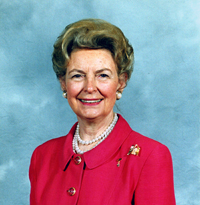Standing firm in its decision to award conservative activist Phyllis Schlafly with an honorary doctorate, the Commencement ceremony occurred yesterday in the midst of students and other University members silently protesting the University’s decision to award Schlafly with an honorary degree.
As Margaret Bush Wilson, a retired civil rights attorney, introduced Schlafly, hundreds of students and some faculty members turned their backs away from the stage. Participating students, parents, siblings and professors also wore white armbands to show their opposition. 10,000 white armbands and leaflets containing information about Schlafly’s views were made in anticipation of the protest.
Despite these obvious displays of objection, Associative Vice Chancellor and Executive Director of University Communications Steve Givens said that the protests did not detract from the main intent of the graduation ceremony.
“The students and faculty members involved in planning the protest communicated with the University administration prior to commencement about their plans during the commencement as well as requesting a place to handout their flyers and armbands,” Givens wrote in an e-mail to Student Life. “The University supported their right to do this. Their protest was strong and well organized, and yet it did not detract from the dignity of the commencement exercises.”
Although Chancellor Mark Wrighton sent out an e-mail to the University community prior to commencement which stated that the University does not endorse Schlafly’s controversial views but rather supports the contribution she has made to political discourse, Women and Gender Studies Professor Michael Murphy said that honorary degree still felt like an endorsement of Schlafly’s views.
“The protest is not an effort to censor Phyllis Schlafly,” Murphy said. “She has spoken on our campus before, and she has rights as an alumnus of Washington University. We have a problem because the degree sounds like an endorsement, or an honoring of the way she works. She engages in slander, calumny, and sometimes outright lies. She is a bad example for our students, and they’re holding her up as a role model.”
During the presentation of Schlafly’s degree Wilson also emphasized the importance of diverse opinions and said that the degree was meant to honor the magnitude of influence that Schlafly has had, and not to honor her views.
However, protester Ernest Gonzales, a graduate student from the School of Social Work, said that there is a clear distinction between free speech and honoring someone.
“No one is against her right to speak. It’s apples and oranges when it comes to having the right to speak and being honored,” Gonzales said.
According to yesterday’s Post Dispatch article, Schlafly felt her detractors were immature and did not respect the role of the housewife. She said however, that she was still touched by the University’s decision to honor her.
“I’m not sure they’re mature enough to graduate,” Schlafly was quoted as saying in the article.
In light of the controversy surrounding the University’s decision to award Schlafly, many questions have surfaced regarding the University’s process in deciding who to award honorary degrees to.
In his e-mail, Wrighton said that the traditional process of determining candidates for honorary degrees was followed with Schlafly. A community member nominated Schlafly for the honor and the nomination was reviewed by the University’s Honorary Degree Committee.
“The Committee included faculty, students, trustees and administrators. After two meetings, Mrs. Schlafly and other nominees were recommended unanimously for consideration at the full Board meeting. The full Board voted to award the honorary degree at the May 2007 meeting,” Wrighton wrote in the e-mail.
Many people have expressed concern over this process and think that the University needs to make changes to the procedure.
“I would like to see more conversation with decisions, and more transparency in the process. This decision reflects on Wash U nationally,” Erin McGlothlin, a professor in the German department who was involved with the protest, said.
Givens said that while no concrete changes have been made yet, the University will reevaluate the process for awarding honorary degrees.
“Given the short time that has passed, there are no specific plans yet, of course, but Chancellor Wrighton mentioned in the [e-mail] that, he has made a commitment that the University will review the process for awarding honorary degrees and will propose appropriate changes,” Givens said.
Ultimately, faculty and students stressed that the focus of commencement should always be on the graduates. Graduating senior Sari Abraham said that the controversy surrounding Schlafly detracted from the ceremonies.
“This is not how we want to remember Commencement,” said Sari Abraham. “The most offensive thing is bringing in someone so controversial that Commencement becomes about her,” Abraham said.
 Courtesy of WUSTL Photo Services
Courtesy of WUSTL Photo Services Courtesy of Mark Partridge
Courtesy of Mark Partridge